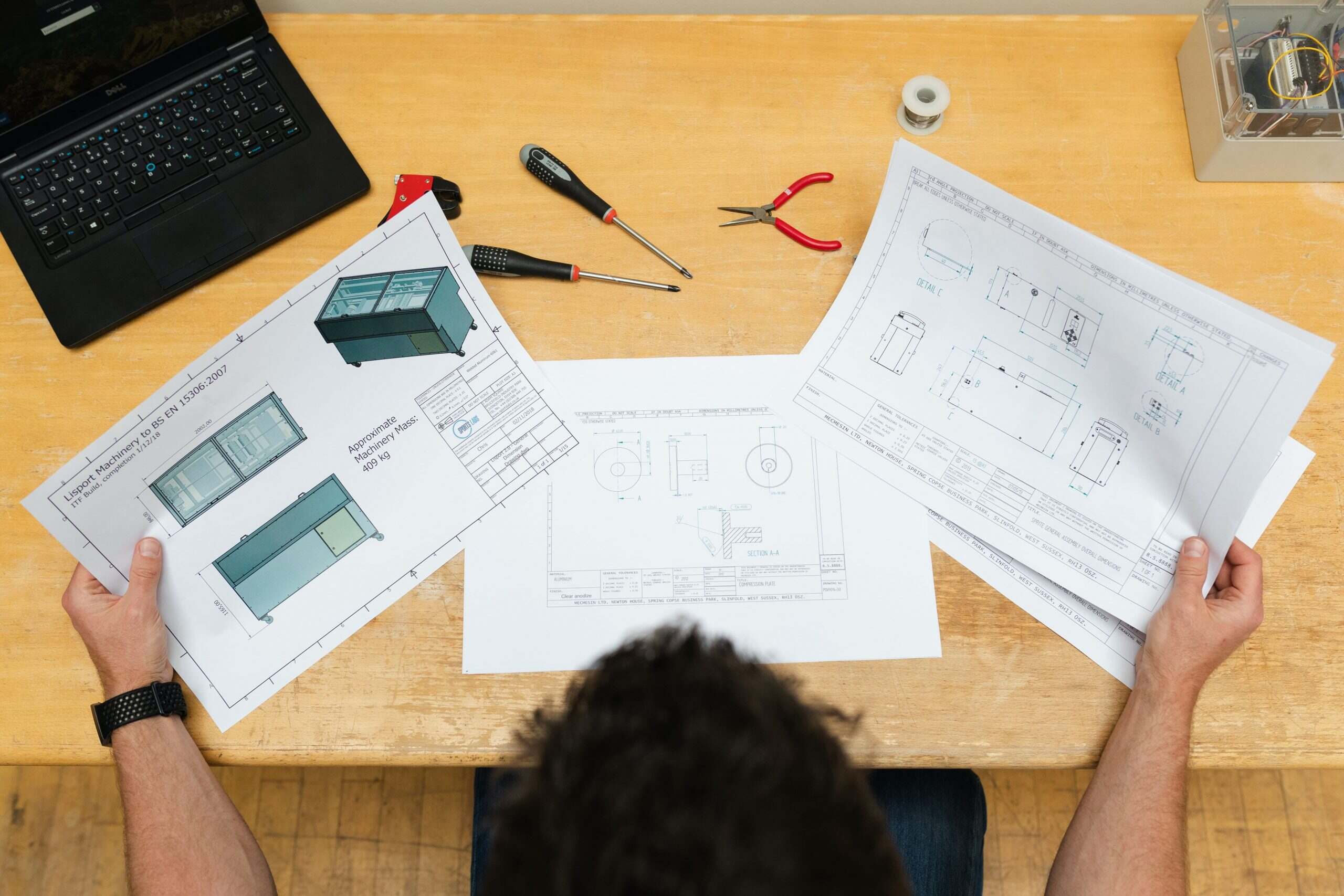Home>diy>Planning & Engineering>What Is A Civil Engineering Technician


Planning & Engineering
What Is A Civil Engineering Technician
Modified: October 21, 2024
Learn what a civil engineering technician does and how they contribute to the planning and engineering process. Gain insights on their role and responsibilities.
(Many of the links in this article redirect to a specific reviewed product. Your purchase of these products through affiliate links helps to generate commission for Storables.com, at no extra cost. Learn more)
Introduction
In the field of civil engineering, there are various professionals who play crucial roles in the planning and execution of construction projects. One such key role is that of a civil engineering technician. A civil engineering technician is a skilled individual who works alongside civil engineers to assist in the design, construction, and maintenance of infrastructure projects.
Civil engineering technicians are the backbone of the construction industry, providing essential support to ensure that projects are completed successfully and in accordance with the highest standards of quality and safety. They are involved in a wide range of tasks, from conducting site surveys and collecting data to preparing design plans and assisting in project management.
Throughout this article, we will explore the role of a civil engineering technician, the educational requirements, the essential skills and competencies needed for the profession, their daily responsibilities, work environment, salary prospects, and opportunities for advancement.
By delving into the world of civil engineering technicians, we can gain a deeper understanding of their crucial role and the impact they have on the built environment.
Key Takeaways:
- Civil engineering technicians play a crucial role in the construction industry, bridging the gap between design and execution. Their multifaceted responsibilities and diverse work environment make this career path both challenging and rewarding.
- With competitive salaries, promising job prospects, and various advancement opportunities, a career as a civil engineering technician offers individuals the chance to make a tangible impact on the built environment while continuously growing and evolving within the field.
Read more: What Is Chainage In Civil Engineering
Role of a Civil Engineering Technician
The role of a civil engineering technician is multifaceted and vital to the successful completion of infrastructure projects. They work closely with civil engineers, architects, and other construction professionals to bring designs from concept to reality. Let’s take a closer look at some of the key responsibilities of a civil engineering technician:
- Design Support: Civil engineering technicians assist in the design phase of construction projects. They use computer-aided design (CAD) software to create detailed plans, drawings, and layouts, incorporating the specifications provided by the civil engineer. These plans serve as a blueprint for the construction process.
- Data Collection and Analysis: Civil engineering technicians are responsible for collecting and analyzing data related to the project. This involves conducting site surveys to gather information about the terrain, soil conditions, and existing infrastructure. They also collect data on traffic patterns, environmental factors, and other relevant parameters that may impact the project.
- Material Testing: Civil engineering technicians assist in the testing of construction materials to ensure their quality and adherence to standards. They collect samples and perform tests on materials such as concrete, asphalt, and soil to assess their strength, durability, and suitability for use in the project.
- Project Documentation: Civil engineering technicians are responsible for maintaining accurate and up-to-date project documentation, including reports, progress updates, and change orders. They prepare documentation that complies with regulatory requirements and serves as a record of the project’s timeline, budget, and scope.
- Construction Oversight: Civil engineering technicians play a crucial role in the construction phase of a project. They visit construction sites regularly to ensure that the work is carried out according to the design plans and specifications. They monitor progress, resolve any technical issues that may arise, and ensure compliance with safety regulations.
Overall, civil engineering technicians serve as a bridge between the design and construction teams, providing the technical expertise and support necessary to turn conceptual plans into functional structures. Their attention to detail, analytical skills, and ability to work well in a team contribute to the successful execution of construction projects.
Education and Training Requirements
To pursue a career as a civil engineering technician, individuals typically need to complete a post-secondary education program in civil engineering technology or a related field. The specific educational requirements may vary depending on the employer and the complexity of the projects involved. Let’s explore the common educational and training requirements for civil engineering technicians:
Post-Secondary Education: Most employers prefer candidates who have completed an associate’s degree or diploma program in civil engineering technology from a recognized institution. These programs provide a solid foundation in the principles of civil engineering and cover subjects such as surveying, structural analysis, materials testing, CAD software, and construction management. Some institutions also offer bachelor’s degree programs in civil engineering technology, which provide more in-depth knowledge and can lead to advanced career opportunities.
Internship or Co-op Experience: Many educational programs include mandatory internships or co-op placements as part of the curriculum. These opportunities allow students to gain practical experience in the field, working alongside professionals and applying their theoretical knowledge to real-world projects. Internships and co-op positions can provide valuable industry connections and enhance employment prospects after graduation.
Certifications and Licenses: In some jurisdictions, civil engineering technicians may be required to obtain professional certifications or licenses to practice in certain roles or participate in specific projects. These certifications are typically issued by professional engineering associations or regulatory bodies and may require the completion of exams and demonstration of a certain level of experience and expertise. Professional certifications can enhance credibility and open up more advanced career opportunities.
Continuing Education: The field of civil engineering is constantly evolving, with new technologies and methodologies being introduced. Civil engineering technicians are encouraged to engage in continuing education and professional development activities to stay updated with the latest industry trends and advancements. This can involve attending workshops, seminars, and conferences, as well as pursuing additional certifications or advanced degrees.
It’s important for aspiring civil engineering technicians to research the specific educational requirements and industry expectations in their area of interest. Some employers may also offer on-the-job training programs to supplement formal education and provide hands-on experience with company-specific practices and procedures. By obtaining the necessary education and staying current with industry standards, individuals can embark on a rewarding career as a civil engineering technician.
Skills and Competencies
Being a successful civil engineering technician requires a combination of technical knowledge and a range of skills and competencies. Let’s explore some of the key skills and competencies that are essential for individuals working in this field:
- Technical Knowledge: Civil engineering technicians must have a solid understanding of civil engineering principles, including surveying techniques, construction materials, structural analysis, and CAD software. They should be familiar with relevant codes and regulations to ensure compliance in their designs and construction processes.
- Communication Skills: Effective communication is crucial for civil engineering technicians as they collaborate with various stakeholders, including civil engineers, architects, construction workers, and clients. They need to be able to clearly convey information, listen actively, and ask questions to ensure a thorough understanding of project requirements.
- Problem-Solving Abilities: Civil engineering technicians routinely encounter challenges and obstacles during the design and construction phases of projects. They must be able to analyze problems, think critically, and come up with practical and innovative solutions. This may involve adapting designs, troubleshooting construction issues, or implementing changes to meet project objectives.
- Attention to Detail: Precision and accuracy are crucial in the field of civil engineering. Technicians must pay close attention to details to ensure that designs, calculations, and measurements are correct. Mistakes in these areas can have significant consequences on the safety and integrity of structures.
- Teamwork and Collaboration: Civil engineering technicians work as part of a team, collaborating with engineers, architects, and other professionals. They should be able to work well in a team environment, contribute ideas, and actively participate in discussions. Effective teamwork skills help ensure that projects are executed smoothly and efficiently.
- Time Management: Civil engineering technicians often work on multiple projects simultaneously and need to manage their time effectively. They must prioritize tasks, meet deadlines, and ensure that project milestones are achieved on schedule. Strong time management skills help maintain productivity and prevent delays in project delivery.
- Attention to Safety: Safety is of utmost importance in the construction industry. Civil engineering technicians must be aware of safety regulations, implement proper safety measures, and promote a culture of safety among project team members. They should be vigilant and proactive in identifying potential hazards and taking appropriate action to mitigate them.
Developing and honing these skills and competencies is essential for individuals aspiring to become successful civil engineering technicians. By combining technical knowledge with effective communication, problem-solving abilities, attention to detail, and a collaborative mindset, technicians can contribute to the successful completion of construction projects and make a positive impact on the built environment.
Daily Responsibilities
As a civil engineering technician, your daily responsibilities may vary depending on the stage of the project and the specific tasks assigned to you. However, there are several core responsibilities that are common to most civil engineering technician roles. Let’s explore some of these daily responsibilities:
- Reviewing Project Plans: One of the first tasks at the start of the day is to review the project plans and specifications. This involves studying design drawings, construction documents, and any updates or changes that may have occurred. It is important to have a thorough understanding of the project requirements and any updates to effectively carry out the daily tasks.
- Conducting Site Visits: Civil engineering technicians often visit construction sites to monitor progress, conduct inspections, and ensure that work is being carried out as per the design plans and specifications. During site visits, they may need to assess construction quality, check for compliance with safety regulations, and address any issues that arise in real-time.
- Collecting and Analyzing Data: Data collection is an integral part of a civil engineering technician’s daily responsibilities. They may need to collect data on various aspects of the project, such as topography, soil conditions, traffic patterns, and environmental factors. This data is then analyzed and used to inform design decisions and construction processes.
- Preparing Design Drawings and Reports: Civil engineering technicians are responsible for creating detailed design drawings using computer-aided design (CAD) software. They may also be required to prepare reports summarizing their findings, documenting construction progress, or presenting data analysis. These documents serve as a record of the project and are crucial for communication and decision-making.
- Collaborating with Team Members: Effective collaboration is essential in the field of civil engineering. Civil engineering technicians work closely with civil engineers, architects, contractors, and other professionals. They need to communicate and coordinate with team members to ensure alignment of goals, exchange information, and provide support throughout the project lifecycle.
- Implementing Quality Control Measures: Civil engineering technicians play a vital role in ensuring the quality of construction work. They may be responsible for conducting quality control tests on construction materials, inspecting completed work for compliance with design plans, and identifying any deficiencies or deviations that need to be addressed.
- Staying Updated with Industry Standards: The field of civil engineering is dynamic, with new technologies and best practices emerging regularly. It is essential for civil engineering technicians to stay updated with the latest industry standards and advancements. This may involve reading industry publications, attending training sessions, or participating in professional development activities.
These daily responsibilities require a combination of technical expertise, strong communication skills, and attention to detail. By performing these tasks efficiently, civil engineering technicians contribute to the successful completion of projects and the development of infrastructure that meets the needs of communities and organizations.
A civil engineering technician assists in the design, construction, and maintenance of infrastructure projects. They often work under the supervision of civil engineers and play a crucial role in ensuring projects are completed successfully.
Read more: What Is Surveying In Civil Engineering
Work Environment
The work environment of a civil engineering technician can vary depending on the nature of the projects they are involved in. Here are some key aspects to consider:
Office Setting: Civil engineering technicians spend a significant amount of time working in an office environment. This is where they review project plans, prepare design drawings, analyze data, and communicate with team members. They use various software applications such as CAD software, project management tools, and spreadsheet software to complete their tasks.
Fieldwork: Civil engineering technicians often have to visit construction sites to conduct inspections, monitor progress, and ensure that work is being carried out as per specifications. Fieldwork may involve working outdoors in various weather conditions, navigating uneven terrain, and using equipment such as surveying instruments, testing devices, and safety gear.
Collaboration: Collaboration is an essential part of a civil engineering technician’s work environment. They work closely with civil engineers, architects, contractors, and other professionals. This collaboration may take place in both office and field settings and involves regular communication and coordination to achieve project goals.
Work Hours: Civil engineering technicians typically work full-time, following regular business hours. However, they may need to work additional hours, especially when project deadlines are approaching or when there is a need to address urgent issues on construction sites. Flexibility in work hours may be required to accommodate site visits or meetings with stakeholders.
Safety Considerations: Safety is a top priority in the field of civil engineering. Civil engineering technicians must adhere to safety protocols and regulations during fieldwork, wear appropriate personal protective equipment (PPE), and stay vigilant to identify and mitigate any potential hazards on construction sites.
Travel: Depending on the location of projects, civil engineering technicians may need to travel to different sites. This can involve commuting between the office, construction sites, and client meetings. Travel requirements may vary depending on the scope and duration of projects.
Overall, the work environment of a civil engineering technician is a combination of indoor and outdoor settings, requiring both technical and collaborative skills. They work on a diverse range of projects, contributing to the construction of buildings, infrastructure, and transportation systems that improve the quality of life for communities.
Salary and Job Outlook
The salary of a civil engineering technician can vary depending on factors such as education, experience, location, and the size and type of the employer. However, in general, civil engineering technicians enjoy competitive salaries and promising job prospects. Let’s explore the salary range and job outlook for this profession:
Salary: According to the U.S. Bureau of Labor Statistics, as of May 2020, the median annual wage for civil engineering technicians was $53,410. The lowest 10 percent earned less than $34,790, while the highest 10 percent earned more than $86,760. Salary can also vary depending on the industry, with architectural and engineering services, local government, and construction firms being some of the top employers for civil engineering technicians.
Job Outlook: The job outlook for civil engineering technicians is favorable. The employment of civil engineering technicians is projected to grow 2 percent from 2019 to 2029, which is slower than the average for all occupations. However, the demand for technicians is expected to vary by specialization and geographic location. The need to repair, upgrade, and maintain the country’s aging infrastructure is expected to drive demand for civil engineering technicians, particularly in areas such as transportation, water resource management, and environmental engineering.
Furthermore, the increasing emphasis on sustainable infrastructure, green building practices, and environmental considerations is expected to create additional job opportunities for civil engineering technicians with knowledge and expertise in these areas. Technicians who possess strong technical skills, professional certifications, and experience working with advanced software tools may have a competitive edge in the job market.
Overall, the combination of competitive salaries and positive job prospects makes a career as a civil engineering technician an attractive option for individuals interested in working in the field of construction and infrastructure development.
Advancement Opportunities
A career as a civil engineering technician offers various advancement opportunities for individuals who are dedicated to continuous learning and growth. Let’s explore some potential paths for advancement within the field:
- Specialization: As civil engineering technicians gain experience, they have the opportunity to specialize in specific areas of civil engineering. This can include fields such as geotechnical engineering, transportation engineering, structural engineering, or environmental engineering. By acquiring specialized knowledge and expertise, technicians can take on more challenging projects and expand their career opportunities.
- Senior Technician or Lead Role: With years of experience and demonstrated competence, civil engineering technicians may have the opportunity to advance to senior technician or lead roles. In these positions, they take on more responsibilities, such as overseeing a team of technicians, managing projects, and serving as a point of contact for clients and stakeholders.
- Project Management: Some civil engineering technicians transition into project management roles. They utilize their technical knowledge and experience to plan, execute, and monitor construction projects, ensuring adherence to timelines, budgets, and quality standards. Project management roles offer increased responsibility and decision-making authority.
- Further Education: For individuals seeking advanced career opportunities, pursuing further education can be beneficial. This can include earning a bachelor’s degree in civil engineering or a related field, which may qualify them for higher-level positions such as civil engineer or construction manager. Advanced degrees, such as a master’s degree or a Ph.D., can open the doors to research, academic, or consulting roles.
- Professional Certifications: Obtaining professional certifications can enhance career prospects and demonstrate expertise in specific areas of civil engineering. Certifications such as the Certified Engineering Technician (CET) designation offered by the National Institute for Certification in Engineering Technologies (NICET) or the Leadership in Energy and Environmental Design (LEED) certification can help technicians stand out in the job market and qualify for specialized roles.
- Mentoring and Teaching: Experienced civil engineering technicians can also explore opportunities to mentor and teach aspiring technicians. They can become mentors within their organizations or take on teaching roles in educational institutions or industry training programs. Sharing knowledge and helping others grow in their careers can be personally fulfilling and contribute to the advancement of the profession as a whole.
Advancement opportunities in the field of civil engineering technology are often dependent on a combination of experience, education, and professional development. By continuously expanding their knowledge, mastering new technologies, and actively seeking growth opportunities, civil engineering technicians can progress in their careers and reach new heights within the industry.
Conclusion
A career as a civil engineering technician offers a challenging and rewarding path for individuals who have a passion for construction, problem-solving, and making a tangible impact on the built environment. Throughout this article, we have explored the role of a civil engineering technician, the education and training requirements, the essential skills and competencies needed, the daily responsibilities, the work environment, the salary prospects, and the advancement opportunities.
Civil engineering technicians play a vital role in the construction industry, working alongside civil engineers and other professionals to bring construction projects from concept to completion. They assist in designing infrastructure projects, collecting and analyzing data, performing quality control tests, and ensuring that projects are executed efficiently and in compliance with safety standards.
To embark on a career as a civil engineering technician, individuals typically need to complete a post-secondary education program in civil engineering technology or a related field. This education provides the foundational knowledge and skills necessary to perform the job effectively. However, continuing education and professional development are also crucial for staying updated with industry trends and advancements.
Civil engineering technicians require a combination of technical expertise, communication skills, problem-solving abilities, attention to detail, and the ability to work well in a team. These skills and competencies contribute to their success in executing construction projects and achieving project goals.
The work environment of a civil engineering technician can vary, with a mix of office-based work and fieldwork. They collaborate with various professionals, visit construction sites, and ensure that projects are carried out according to the design plans and specifications. Safety considerations are paramount in the field, and technicians must adhere to safety regulations and implement proper safety measures.
In terms of salary and job outlook, civil engineering technicians generally enjoy competitive salaries, and the job prospects are favorable, especially in areas such as infrastructure repair and sustainable development. Advancement opportunities exist through specialization, senior roles, project management, further education, professional certifications, and mentoring.
In conclusion, a career as a civil engineering technician offers a fulfilling and dynamic pathway within the construction industry. With the right mix of education, skills, experience, and dedication to growth, individuals can contribute to the development of infrastructure and shape the world we live in.
Curious about how big projects get off the ground? After understanding the vital role of civil engineering technicians, you might wonder who manages these large-scale operations from start to finish. Our next article on "Construction Management" dives into the intricacies of overseeing construction projects, ensuring they meet deadlines, budgets, and blueprints for success. Discover how these professionals navigate the complexities of building and what makes effective management in the construction arena.
Frequently Asked Questions about What Is A Civil Engineering Technician
Was this page helpful?
At Storables.com, we guarantee accurate and reliable information. Our content, validated by Expert Board Contributors, is crafted following stringent Editorial Policies. We're committed to providing you with well-researched, expert-backed insights for all your informational needs.















0 thoughts on “What Is A Civil Engineering Technician”